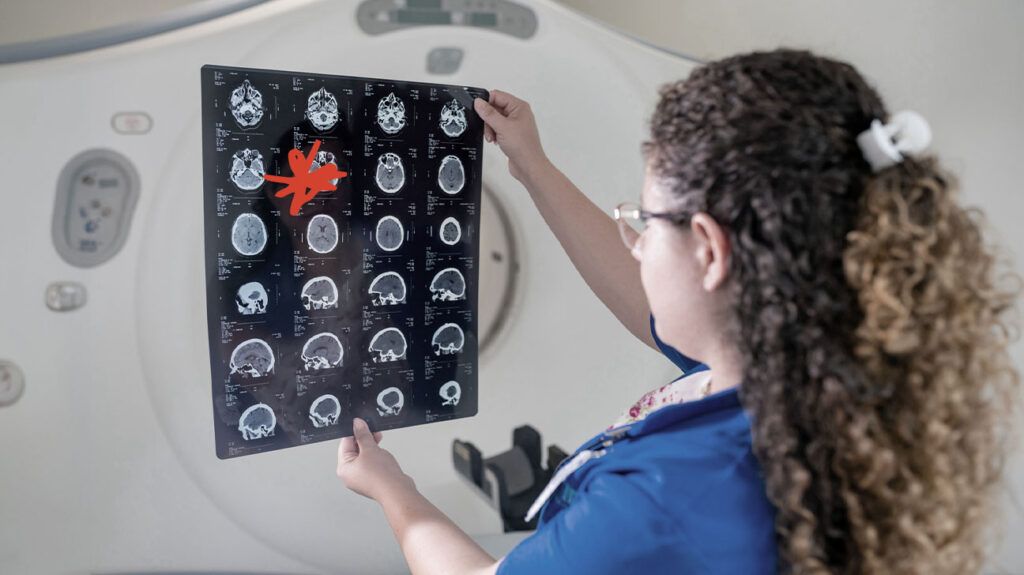
- About 32 million people globally have Alzheimer’s disease.
- There are some medications — such as anti-amyloid monoclonal antibodies — that can help slow disease progression.
- Researchers from the West Virginia University Rockefeller Neuroscience Institute say a combination of focused ultrasound and anti-amyloid monoclonal antibody medications can speed up the clearance of beta-amyloid plaques in the brains of people with Alzheimer’s disease.
The neurodegenerative disorder Alzheimer’s disease affects about
There is currently no cure for Alzheimer’s disease. There are some
One such type of medication is called
Now researchers from the West Virginia University Rockefeller Neuroscience Institute have discovered that a combination of
The study was recently published in The New England Journal of Medicine.
According to researchers, some anti-amyloid monoclonal antibody treatments for Alzheimer’s have
The blood-brain barrier is a semi-permeable membrane between blood vessels and the brain. While it helps keep harmful substances out of the brain, it also affects how well medications can enter the brain.
“The blood-brain barrier limits more than 98% of drugs and therapeutics from getting into the brain from the blood vessels,” Dr. Ali R. Rezai, director of the Rockefeller Neuroscience Institute and associate dean, John D. Rockefeller IV tenured professor in neuroscience at West Virginia University, and lead author of this study explained to Medical News Today.
“As such, the anti-beta amyloid antibodies do not readily cross the blood-brain barrier,” Dr. Rezai continued. “If we can open the blood-brain barrier in areas with high beta-amyloid in the brain, we can increase the access of the antibody to the brain after infusion of the antibody.”
For this study, Dr. Rezai and his team decided to look at the use of focused ultrasound to safely and temporarily open the blood-brain barrier to provide greater access for the anti-amyloid antibodies to the brain.
“Focused ultrasound is a minimally invasive outpatient technology that is not a surgical procedure. The focused ultrasound temporarily opens the blood-brain barrier, thus allowing for more antibody to get into the brain that normally would be a challenge because of the barrier.”
– Dr. Ali R. Rezai
A study published in March 2023 found the use of focused ultrasound to open the blood-brain barrier to have
During the study, three people with mild Alzheimer’s disease received six monthly infusions of aducanumab that were immediately followed by focused ultrasound to open the blood-brain barrier in regions of the brain with high amyloid-beta plaques.
After 6 months of the combination of focused ultrasound and antibody treatment, researchers found an average of 32% fewer beta-amyloid plaques in brain areas with blood-brain barrier opening compared to areas that were not opened.
“We expected increased clearance of antibodies with blood-brain barrier opening,” Dr. Rezai said. “This hypothesis was confirmed with this initial study. We need to study additional patients and with longer follow-up.”
He also said they plan to next combine lecanemab with the blood-brain barrier opening.
“Lecanemab is the new
After reviewing this study, Dr. Karen D. Sullivan, a board-certified neuropsychologist, owner of I CARE FOR YOUR BRAIN, and Reid Healthcare Transformation Fellow at FirstHealth of the Carolinas in Pinehurst, NC, told MNT that this approach makes good scientific sense, as getting therapeutic molecules past the highly selective blood-brain barrier has been a major challenge.
“Drugs designed to improve brain function have to make their way into the brain to do their job, and this is much harder than people think,” Dr. Sullivan explained.
She noted:
“This sophisticated gating system (the blood-brain barrier) keeps a lot of bad stuff out but it occasionally poses a problem like when we want to get chemotherapy directly into someone’s brain or in the case of the new anti-amyloid-beta monoclonal antibody therapies when the more drugs we get in, the more clearance of amyloid we can get.”
“Focused ultrasound has been a cutting-edge, non-invasive form of
As for the next steps in this research, Dr. Sullivan said she would like to know what, if any, increased functional gains these three patients saw with the additional 32% clearance of amyloid.
“Did cognitive testing improve or not decline as quickly?” she continued. “Were there any changes in everyday function or mood/behavior? At the end of the day, that’s what we want from Alzheimer’s treatments — a change in brain function, not just brain structure.”
MNT also spoke with Dr. Jennifer Bramen, a senior research scientist at the Pacific Neuroscience Institute in Santa Monica, California, about this study.
Dr. Bramen said her initial reaction to this study was that focused ultrasound has the potential to be a delivery system for many therapeutics.
“Anti-amyloid-beta monoclonal antibody therapies need to reach the brain to be effective,” she explained. “While the blood-brain barrier is a protective shield, it poses an obstacle to delivering these therapies. The findings in this small sample study are encouraging. An important next step would be to conduct a larger sample, randomized clinical trial.”